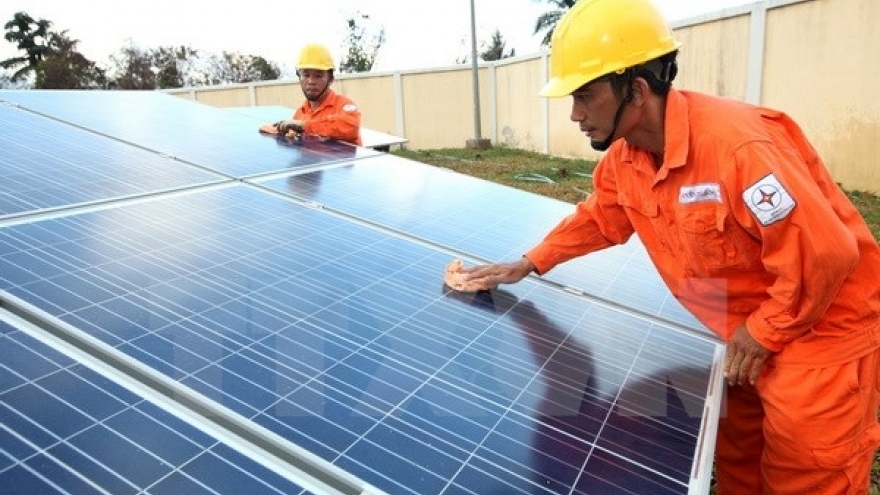ROK banks to expand in Vietnam
In addition to the wave of investments in the banking and finance sector from financial institutions in Japan, UK, Hong Kong, Singapore, Malaysia and the US, there will be a marked presence of South Korean banks in the Vietnamese market in the near future, observers forecast.
 |
The observers, who declined to be named, told Trí thức trẻ (Young Intellectual) online newspaper that there could be big deals involving South Korean companies in the future, following a series of co-operation agreements between South Korean and Vietnamese financial institutions recently.
In the middle of July, a major South Korean bank, Daegu, announced that a comprehensive co-operation agreement had been signed with Vietnam’s Orient Commercial Joint Stock Bank (OCB).
Nguyen Dinh Tung, general director of OCB, said Daegu would support OCB in various areas, such as international money transfer, product development, SME services, training exchange programmes on risk management, information technology, and product development in the ROK.
Daegu Bank has pledged to provide the best companion programmes to facilitate OCB’s growth among the South Korean business community in Vietnam, and to share its experience so that OCB will eventually hold a 50% market share in SME services in the country.
In the ROK, Daegu holds over 50% of the market share in the loans to local small- and medium-sized enterprises (SMEs) area.
In mid-April, Korea Development Bank (KDB) marked its presence in Vietnam through a comprehensive co-operation agreement with Commercial Joint Stock Bank for Investment and Development of Vietnam (BIDV).
KDB is the top bank in the ROK in terms of total assets and equity, and ranks 94th in the world. It has a presence in 22 countries.
With the State holding around 95% of its charter capital, BIDV, which tops Vietnam’s commercial banks in total assets, has most room for foreign investors among Vietnam’s privatised banks, of up to 30%.
Ever since BIDV’s shares were listed on the stock market in 2014, its leaders have repeatedly stated that the bank is looking for foreign strategic partners, and could sell 25% to 30% of its stake.
With the co-operation, there is a possibility that the Korean partner may become one of BIDV’s strategic shareholders.
Besides co-operation agreements, financial institutions from the ROK have also been taking more direct, stronger steps into the Vietnamese financial market.
Take the case of Shinhan Bank, which received a licence and became one of the first five banks with 100% foreign capital in Vietnam in 2008.
In April this year, Shinhan surpassed its four rivals to acquire the lucrative retail segment of ANZ Vietnam.
Previously, after acquiring a 50% stake in Shinhan Vina (a joint venture between the Commercial Joint Stock Bank for Foreign Trade of Vietnam or Vietcombank and Shinhan Bank with 50% stake for both), the bank was renamed Shinhan Bank Vietnam in 2011.
ANZ’s retail segment serves around 125,000 individual customers in Vietnam and A$320 million in outstanding loans. The handover is underway and expected to be completed before the end of 2017, sources revealed.
In November last year, the largest lender by assets in the Republic of Korea Woori Bank also officially set up a wholly foreign-owned bank in Vietnam. The bank’s representatives said that Woori Bank would boost its retail business and target becoming the top foreign credit bank in the Vietnamese market.
With the advantage of established trade relations, Vietnam’s untapped potential and global integration goals will make it an ideal destination for South Korean banks.
So Vietnamese banks, though they have been receiving investments, should be well-prepared to compete, if they want to survive and grow.
While Vietnamese banks are still struggling to lend to FDI firms and have seen very modest results in the area, foreign banks, especially South Korean ones, are showing much stronger initiative in not only providing loans to local enterprises but also to Vietnam’s huge projects.
Most recently, the ROK’s Keximbank expressed interest in investing in several metro lines in HCM City and received enthusiastic support from the transport sector.
Minister of Transport Truong Quang Nghia has encouraged Keximbank to invest not only in the metro lines in HCM City, but also in metro projects in Hanoi.
In particular, Nghia hopes Keximbank will fund three other transport projects of Tan Van-Nhon Trach, Lo Te-Rach Soi and My Thuan 2 bridge.


